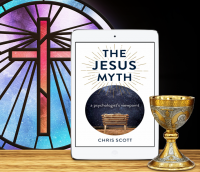
The deeper the spiritual life is, the more personal it becomes
From Taking Heart by Fiona Gardner
Searching for meaning, truth or just to understand yourself better - then this is for you!
‘Within the heart... there are reception rooms and bedchambers in it, doors and porches, and many offices and passages. In it is the workshop of righteousness and of wickedness. In it is death; in it is life ... The heart is Christ’s palace; there Christ the King comes to take his rest, with the angels and spirits of the saints, and he dwells there, walking within it and placing his Kingdom there.’
This was written by the fourth century Orthodox mystic Makarios the Great who describes how ‘there are all things’ in the heart. He writes of the ‘unfathomable depths’ at the core of our being, and the heart as the space where we honestly meet with God. The heart is the metaphorical place of our inner truth, the deepest psychological ground of our personality which is created in the image and likeness of God. As Christians we are asked to love God with all of our heart and to open our hearts to God who knows all the secrets that are hidden there including love, passion, authenticity and goodness, and, the shadow side of these including hate, indifference and falsity. All spiritual journeys are journeys of the heart and like the two halves of the heart include many mixed experiences and feelings: surface and depth, the good and the bad, the person we present to the world and the shadow part of ourselves. The spiritual journey is above all about moving from a predominantly closed heart dominated by self-love and where temptations and distractions obscure the truth for us, to a heart that is predominantly open to God and to love – indeed to the love of God. The open heart is not one sided but rather allows all the experiences to be held in balance, in a way of holding the tension of the opposite emotions through open awareness and trust in the ground of our being.
My recent book Taking Heart published by Christian Alternative Books centres on the idea that the spiritual life is always personal and the deeper the spiritual life is, the more personal it becomes. In this book the experiences of four people who are spiritually searching are explored, and their different journeys through self-doubt to self-acceptance and the heart of faith are discussed – these are ‘ordinary’ people on an ‘extraordinary’ journey. All spiritual journeys include discovery, but also an uncovering and a recovering. The journeys are an exodus away from a form of captivity and also a passion story through the very worst and towards the very best. And throughout these spiritual journeys – as is the case for all of us – God is shaping and forming our inner life in the unknown depths of our heart.
For many years I worked as a psychotherapist – in the NHS and for a charity as well as in private practice. I now see people for spiritual direction – accompanying them in their ever- deepening relationship with God. In both my personal life and in my professional work I have been absorbed for many years in exploring the inner world and how that affects the way we are in the outer world especially with one another, so I thought that I would write here a little about my understanding of the relationship between spirituality and psychology – specifically psychotherapy – the differences and the similarities, and, where the two are working side by side.
Spirituality and psychotherapy overlap, but there are also clearly differences. The relationship is determined in part by how we define both terms and so it is worth exploring first what I mean when I write here about psychotherapy and spirituality. The type of psychotherapy I am most familiar with both professionally and personally is the psychoanalytic where the process is one of uncovering and recovering feelings – some that have been hidden for years, with open and mutual exploration based on the psychodynamics of the relationship between therapist and the person being seen. Whilst there are different approaches to spirituality it is generally a project of self-transcendence that goes against any tendency to reduce spirituality to the purely private or narcissistic quest for one’s own self-realization. It includes the community context and the commitment to social transformation (neither of which are part of the goal of psychotherapy). All traditional spiritual teachings and direction include what we would now call ‘psychotherapeutic’ elements because dealing with the mind or soul means using psychology. But this does not make these teachings, or the spiritual practices linked to them, psychotherapy. There is a connection between the two, but psychotherapy has developed ways of dealing with mental disorder much more effectively than were known by the ancient spiritual teachings. It also takes place in a different context with different emphasis. Spiritual work is not concerned with mental disorder, but rather with connecting the soul with its spiritual nature.
So how about the similarities? Well engaging in deep relational depth is where the fundamental similarity lies. Generally, both spirituality and psychotherapy offer the chance to be open to the full spectrum of experiencing and awareness of what is happening in the present moment, including feeling suffering and deep compassion and empathic awareness. Both develop tacit knowledge, cultivate awareness, and can contribute to liberation from limiting self concepts. Freedom from fear and delusion, from the past, and from early conditioning are common goals. From both there can also be a strengthening of authenticity and self-trust which leads to a sense of integrity and wholeness. Allowing things to be as they are rather than living in a world of illusion and denial is basic for psychological health and spiritual growth. There can be a similarity in a state of non-duality in contemplative prayer with a depth connection (not a state of merging) in psychotherapy where there is a transformative moment which can bring a moment of greatest healing.
One of the central differences is the understanding in spirituality of human suffering, and how adverse life experiences can work towards deepening the focus of spiritual connectedness with God rather than as in psychotherapy where the focus is the person’s emotional wellbeing and ego functioning. Spirituality understands the individual in terms of his or her connectedness or lack of connectedness to the spiritual/ethical nature of reality. However, the psychological view, does not necessarily take this reality either into account or as the primary focus but rather aims to reduce pain and conflict, and enhance the capacity for love and work. In contrast spiritual practice is aimed at waking up, and becoming aware about listening to what God is telling us about himself/herself. It is about entering a mystery and a state of not-knowing.
Spirituality and psychotherapy overlap in the idea that self-knowledge and knowledge of God feed one another, in that the closer you get to the light, the more you see your own darkness. And the closer you get to your own ordinariness as a human the more you know you need the divine. Through psychotherapy one comes to self-knowledge, but Christian spirituality, especially meditation and contemplative prayer is not about knowing, but rather the realisation that Someone Else is doing the knowing through you – where God is operating with you, in you, and even as you. For the monk and writer Thomas Merton the true self is where our deepest subjectivity meets with Christ’s subjectivity; St Catherine of Genoa shouted in the streets, “My deepest me is God!”
Both psychotherapy and spiritual practices such as contemplation can open awareness of limiting self beliefs which can accelerate and assist the process of spiritual development. It can also be the place to understand emotions such as fear, guilt, and anger. If you are preoccupied with depression, anxiety, and self-hate, or dealing with specific emotional hurts then there is little room left for God ... knowing about yourself allows you to begin to let go of self. Merton wrote, ‘What do we gain by sailing to the moon if we are not able to cross the abyss which separates us from ourselves’.
In psychotherapy one learns to forgive oneself. In spiritual practice one is taught to forgive others. Both are necessary for complete forgiveness and well-being. Psychotherapy cultivates love in relationship whilst spirituality awakens the awareness of love’s presence in our lives... both can lead to opening the heart and developing the capacity to give and receive love.
The profession of psychotherapy has been called the secular priesthood of our time, since people seek counsel from therapists in times of stress or transition, much as they used to seek advice from the parish priest. Some psychotherapists can and do fill the role of spiritual guide for their clients. Most do not. Unfortunately, few spiritual teachers are trained as psychotherapists.
Spirituality and psychotherapy are two ways that mutually influence one another and in which we are trying to give something else a chance – and it’s that something else that is of such absorbing interest. Spiritual searching leads us to strange places, but inevitably and truthfully always back towards the heart of our self and our interior life. The paradox is that no matter where we seek God in external structures he is to be found right where we started from within each heart – both transcendent and imminent. He is as we search both familiar and also utterly unknown, both near and at times far, consistent and unpredictable – God.
Fiona Gardner ~ Writer and spiritual director, Anglican much influenced by Thomas Merton.
https://www.collectiveinkbooks.com/christian-alternative-books/our-books/taking-heart
CLICK BOOK COVER TO READ TODAY
YOU MAY ALSO ENJOY
We are all one in Christ
Categories:
0 comments on this article

















